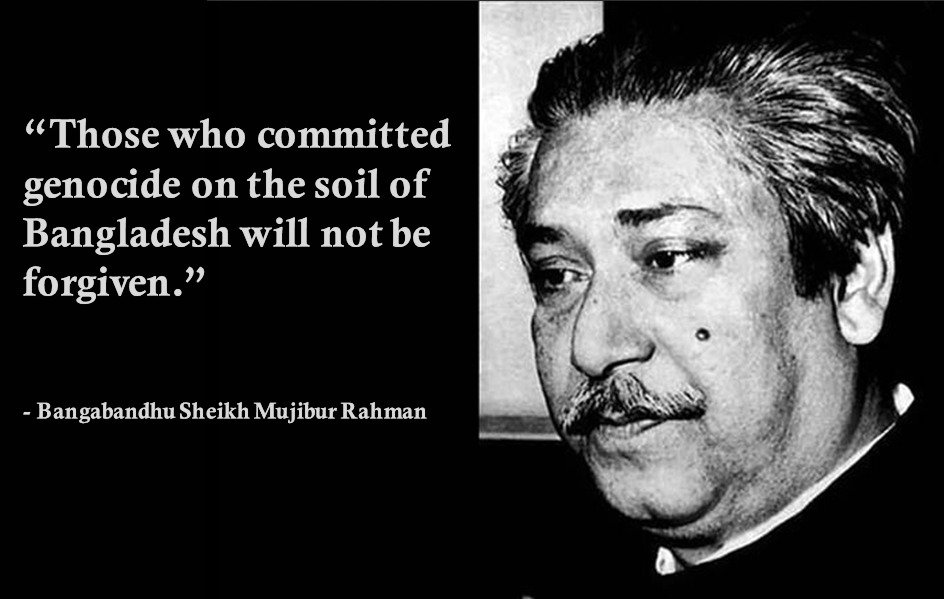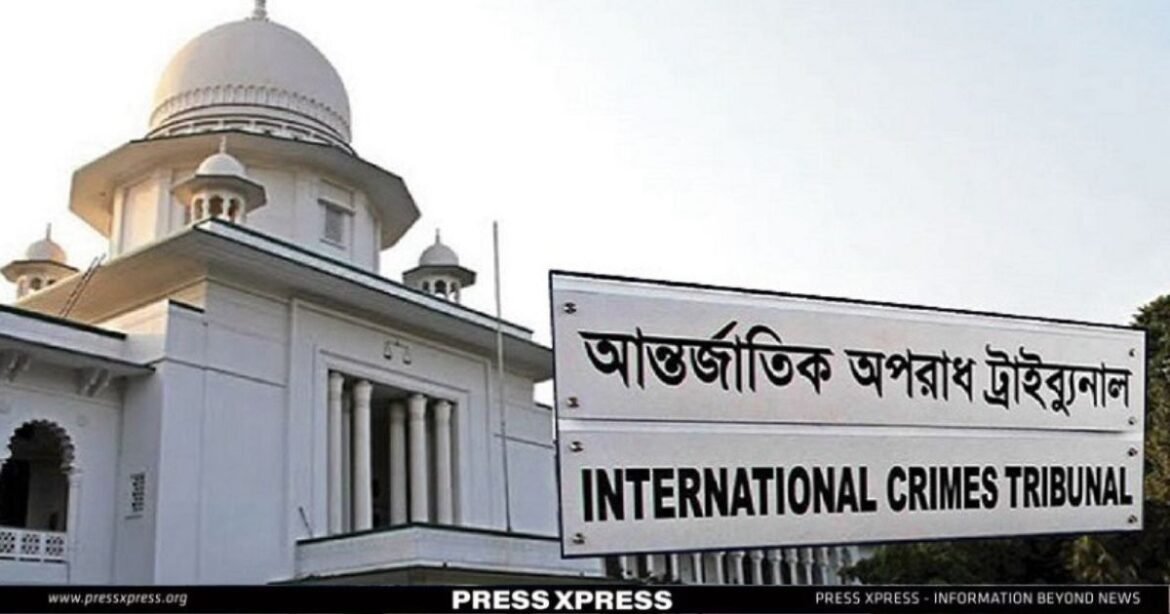The formation of the tribunal, the dynamic process, and the overview of verdicts underscore significant strides in addressing war crimes
Over the past 13 years, the International Criminal Tribunal has reached decisions on 53 cases related to crimes against humanity, during the liberation war. Seven individuals among them have faced execution. The hanging of these seven war criminals, who received death sentences for offenses such as murder, genocide, rape, torture, immigration, and conversion during the liberation war, symbolizes the achievements of the current government. The concerned ministries, investigative bodies of the tribunals, and prosecution lawyers have also expressed their contentment. Notably, Abdul Quader Mollah, a leader of the Jamaat, was executed as the first war criminal in Dhaka Central Jail on December 12, 2013, for crimes against humanity. The trial of war criminals stands out as a significant accomplishment for the Awami League government.

Overview of War Crimes Trial
The first cabinet meeting in the country following independence occurred on December 23, 1971. During this session, the discussion revolved around the trial of war criminals. At that juncture, the then Home Minister A.H.M. Kamaruzzaman declared, “Not only the Pakistanis but also those who collaborated with them will face justice.” Subsequently, during the cabinet assembly on December 31, Prime Minister Tajuddin Ahmad urged public representatives to share information on war crimes.
On January 29, 1972, Bangabandhu Sheikh Mujibur Rahman emphasized that there would be no pardon for those responsible for genocide on Bangladeshi soil. During this period, Bangabandhu appointed S.R. Pal and Sirajul Haque as the government’s chief prosecutors for the trial of war criminals. Unfortunately, the completion of this trial process was hindered by various events after the tragic assassination of the Father of the Nation, Bangabandhu Sheikh Mujibur Rahman.
Formation of International Crimes Tribunal
39 years after the war crimes incident, the Awami League government established the country’s first international crimes tribunal, legal panel, and investigation agency on 25 March 2010.
International Crimes Tribunal At A Glance
- International Crimes Tribunal -1 established date – On March 25, 2010
- Members – 3
- Chairman of the tribunal – Justice Md Nizamul Haque
- International Crimes Tribunal -2 established date – on March 22, 2012
- Members – 3
- Chairman of the tribunal – Justice A. T. M. Fazle Kabir
International Crimes Tribunal -1
On March 25, 2010, a tribunal was formed under Section 6 of the International Crimes (Tribunals) Act of 1973. According to this law, a tribunal consisting of three members, including a chairman, was established. Justice Md Nizamul Haque was appointed as the chairman of the tribunal, and the other two judges were Justice A. T. M. Fazle Kabir and retired district judge A.K.M Zaheer Ahmed.
International Crimes Tribunal -2
To make the judicial process more dynamic, another tribunal with three members was formed on March 22, 2012, under the International Crimes Tribunal Act of 1973. This tribunal is known as ICT-2 or International Crimes Tribunal-2. Justice A. T. M. Fazle Kabir, a member of the first tribunal, was appointed as the chairman of the second tribunal. The other two members were Justice Obaidul Hassan, a High Court judge, and Mohammad Shahinur Islam, the registrar of the first tribunal.
On December 11, 2012, when Chairman Justice Md Nizamul Haque resigned from Tribunal-1, Justice A. T. M. Fazle Kabir was appointed as the chairman of Tribunal-1 on December 13, 2012. The same tribunal members, along with newly appointed High Court Justice Md. Mozibur Rahman Miah were appointed as members of Tribunal-2. Justice Anwarul Haque, a member of Tribunal-1, was made the chairman, and on September 15, 2015, Tribunal-1 was reorganized with Justice Md Shahinur Islam and additional High Court Justice Mohammad Suhrawardi as members, rendering Tribunal-2 inactive.
War Crimes Verdicts Overview
In the last 13 years, 53 cases have been adjudicated in the International Crimes Tribunal. In these cases, verdicts have been delivered against 139 accused individuals. Among them, death sentences have been pronounced for 99 accused. Twenty-five individuals have been sentenced to life imprisonment, and nine have received different terms of imprisonment. Capital punishment has been executed for seven individuals, while the trials of the remaining are still in progress.
According to sources, after the verdicts in the International Crimes Tribunal, the Appeals Division of the judiciary is still reviewing the cases of 12 war criminals. Among them, in 2015, the top leader (Nayeb-e-Ameer) of Jamaat-e-Islami and former MP Muhammad Abdul Quader Mollah and former MP Muhammad Abdus Subhan and Forqan Molla were sentenced to death by International Crimes Tribunal-2. In the same year, the tribunal sentenced to death penalty to Syed Md Hasan Ali, Sheikh Sirajul Haque alias Siraj Master. Besides, Mahidur Rahman, Afsar Rahman, M.A. Jabbar, and Khan M.A. Akram Hossain were also sentenced to death.
War Crimes Verdicts Overview
- Cases have been adjudicated – 53
- Verdicts have been delivered against -139 accused
- Death sentences have been pronounced for – 99 accused
- Sentenced to life imprisonment – 25 accused
- Different terms of imprisonment – 9 accused
Commander M. Mobarakh Hossain and Syed M. Kaisar were sentenced to death in 2014, and in 2016, Ataur Rahman (Nani), and Obaidul Haque (Taher) were executed. The cases of war crimes in the country are being tried in a fair and just manner. After the tribunal verdicts, the final decisions were reached in the Appellate Division of the Supreme Court. In the first instance, Jamaat leader Abdul Quader Mollah, Muhammad Kamaruzzaman, Motiur Rahman Nizami, Ali Ahsan Mohammad Mojaheed, Mir Quasem Ali, and BNP leader Salahuddin Quader Chowdhury were executed. Currently, 43 applications are awaiting resolution. The latest execution took place in 2017 in the case of Jamaat leader Delwar Hossain Sayeedi.
Razakar’s Torture During the Liberation War
During the Liberation War in 1971, Bangladesh witnessed a tumultuous period marked by atrocities committed by the Pakistani military and their local collaborators, known as Razakars, who opposed the independence movement. The Razakars were a paramilitary force supporting the Pakistani regime, and their brutal tactics against civilians and freedom fighters fueled the rage of the Bengali population.
As the war for independence intensified, stories of torture and cruelty perpetrated by the Razakars spread like wildfire. The scenario of torture was harrowing, with reports of clandestine detention centers, where individuals suspected of supporting the liberation movement were subjected to unspeakable acts of violence.
Freedom fighters and sympathizers were rounded up, their homes raided in the dead of night, and they were often tortured for information or forced confessions. The methods employed were gruesome, ranging from physical abuse such as beatings and mutilation to psychological torment through threats and intimidation. The Razakars targeted intellectuals, professionals, and anyone suspected of harboring pro-independence sentiments.
The scenario was further exacerbated by the collaboration between the Pakistani military and the Razakars. The torture was not limited to specific regions but spread across the country, leaving a trail of suffering and anguish. Families were torn apart, and communities lived in perpetual fear.
The liberation forces, in response to these heinous acts, engaged in counterattacks and sought justice for the victims. The scenario of torture became a rallying cry for the independence movement, strengthening the resolve of the Bengali people to break free from the oppressive rule.
The Liberation War ultimately led to the creation of the independent state of Bangladesh, but the scars of the torture inflicted by the Razakars during that tumultuous period remain etched in the collective memory of the nation, serving as a somber reminder of the price paid for freedom.
Conclusion
In the past 13 years, the International Criminal Tribunal has delivered justice for crimes against humanity during the liberation war, executing seven individuals. This symbolizes the government’s commitment to accountability. The formation of the tribunal, the dynamic process, and the overview of verdicts underscore significant strides in addressing war crimes. Despite challenges, the trials stand as a testament to the nation’s determination to erase the stigma of the past, honoring the vision of Bangabandhu Sheikh Mujibur Rahman. The scars of Razakar’s torture during the Liberation War serve as a somber reminder of the sacrifices made for Bangladesh’s freedom.


